Charles E W Bean, Diaries, AWM38 3DRL 606/116/1 - June - September 1918 - Part 3
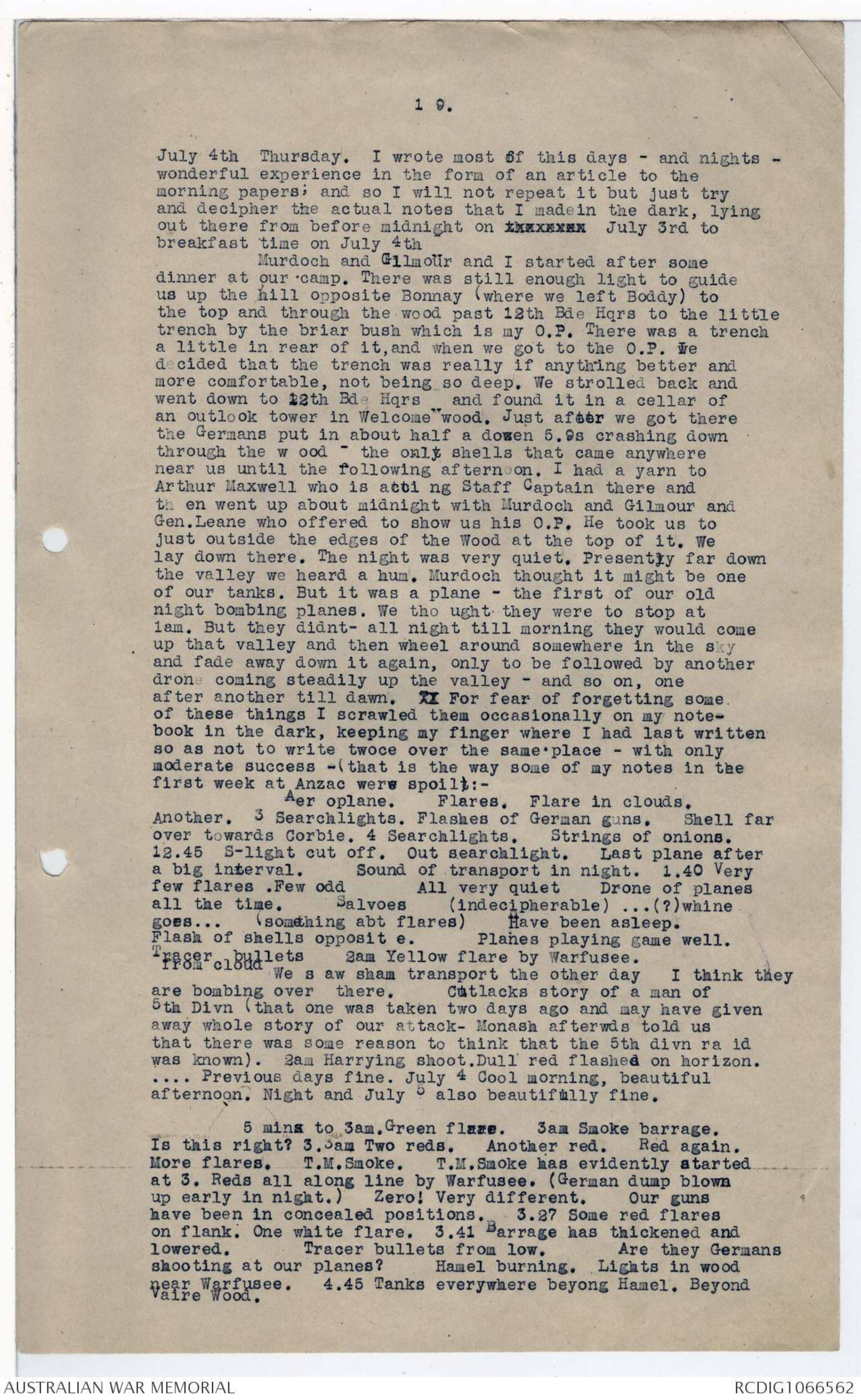
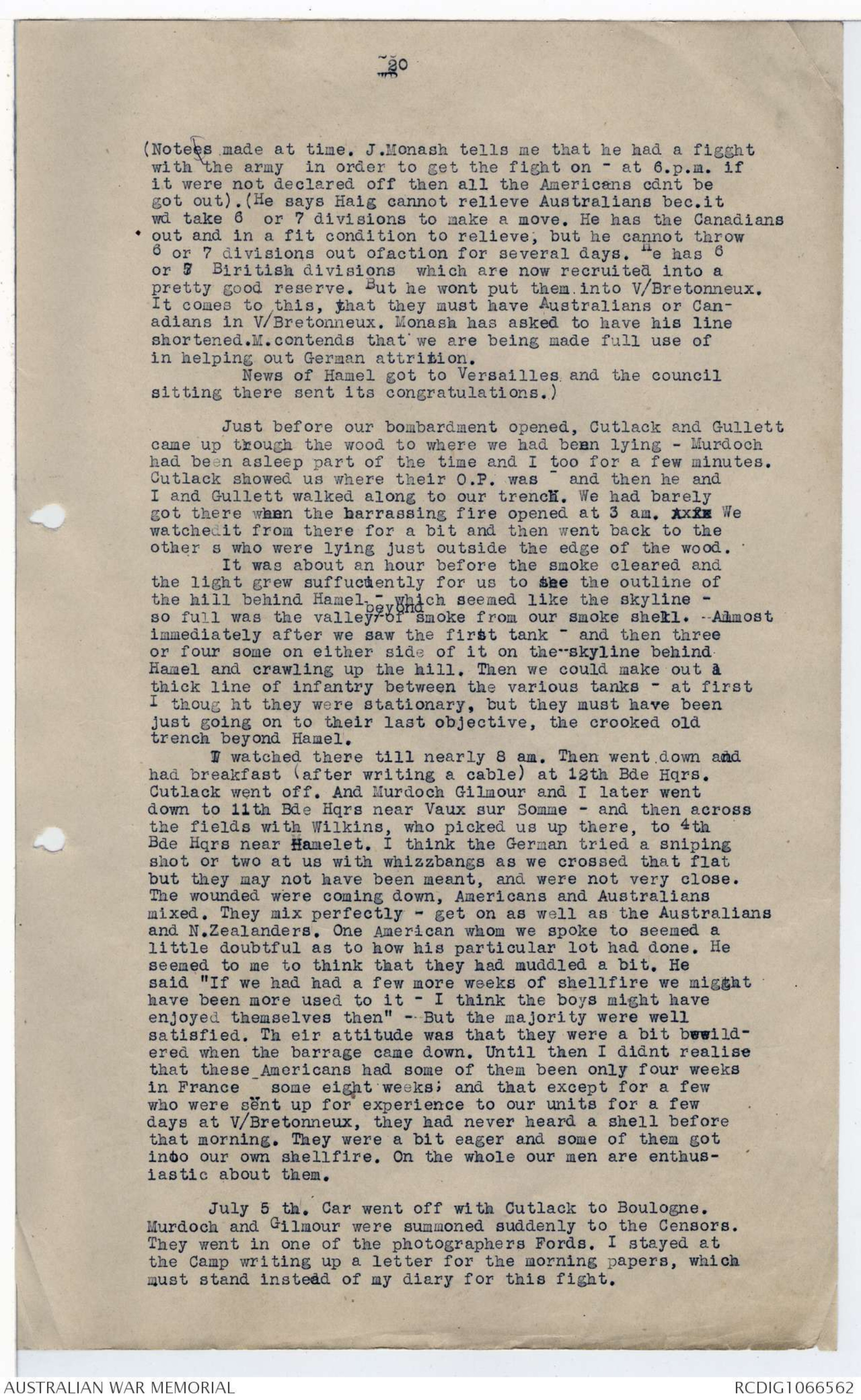
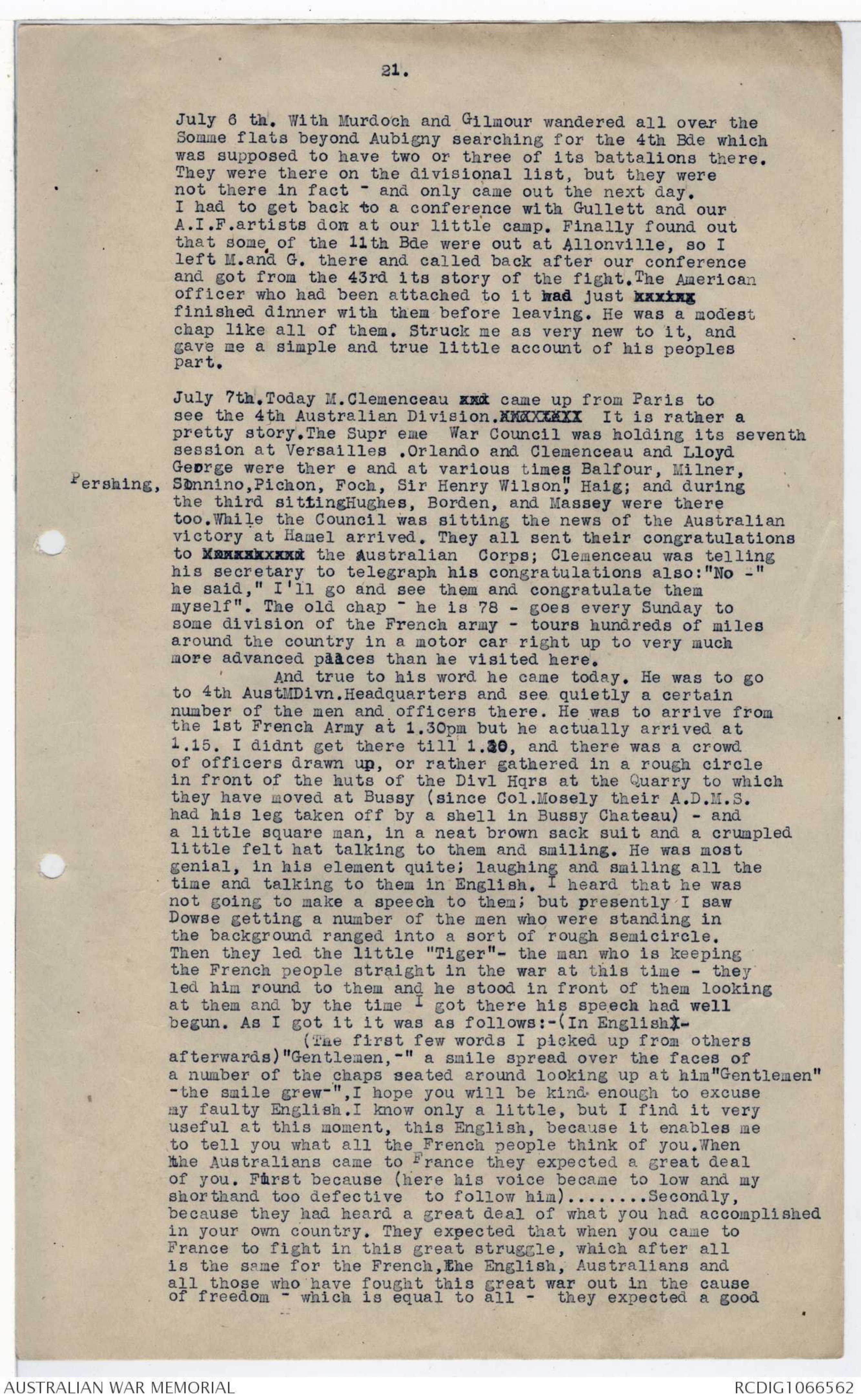
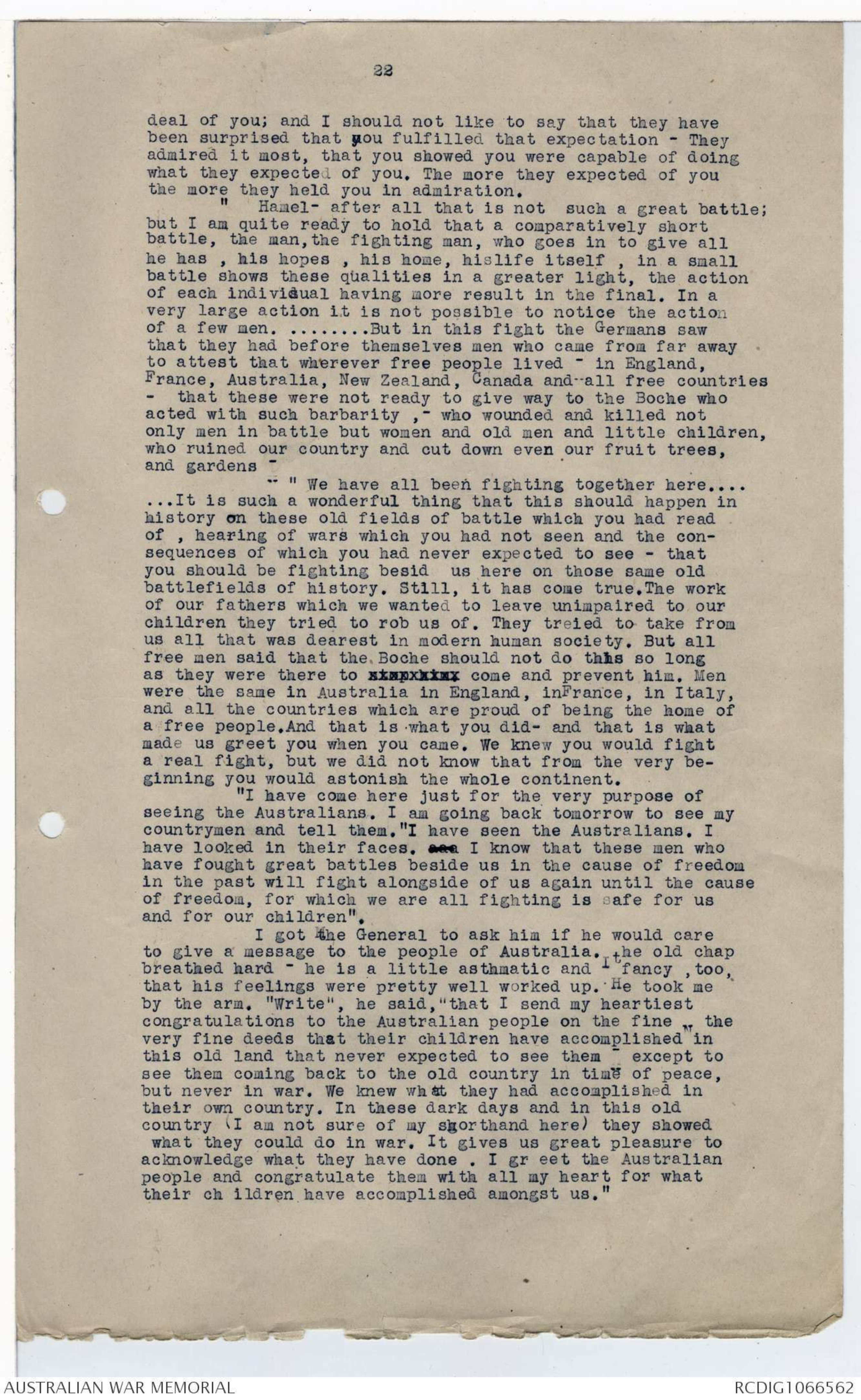
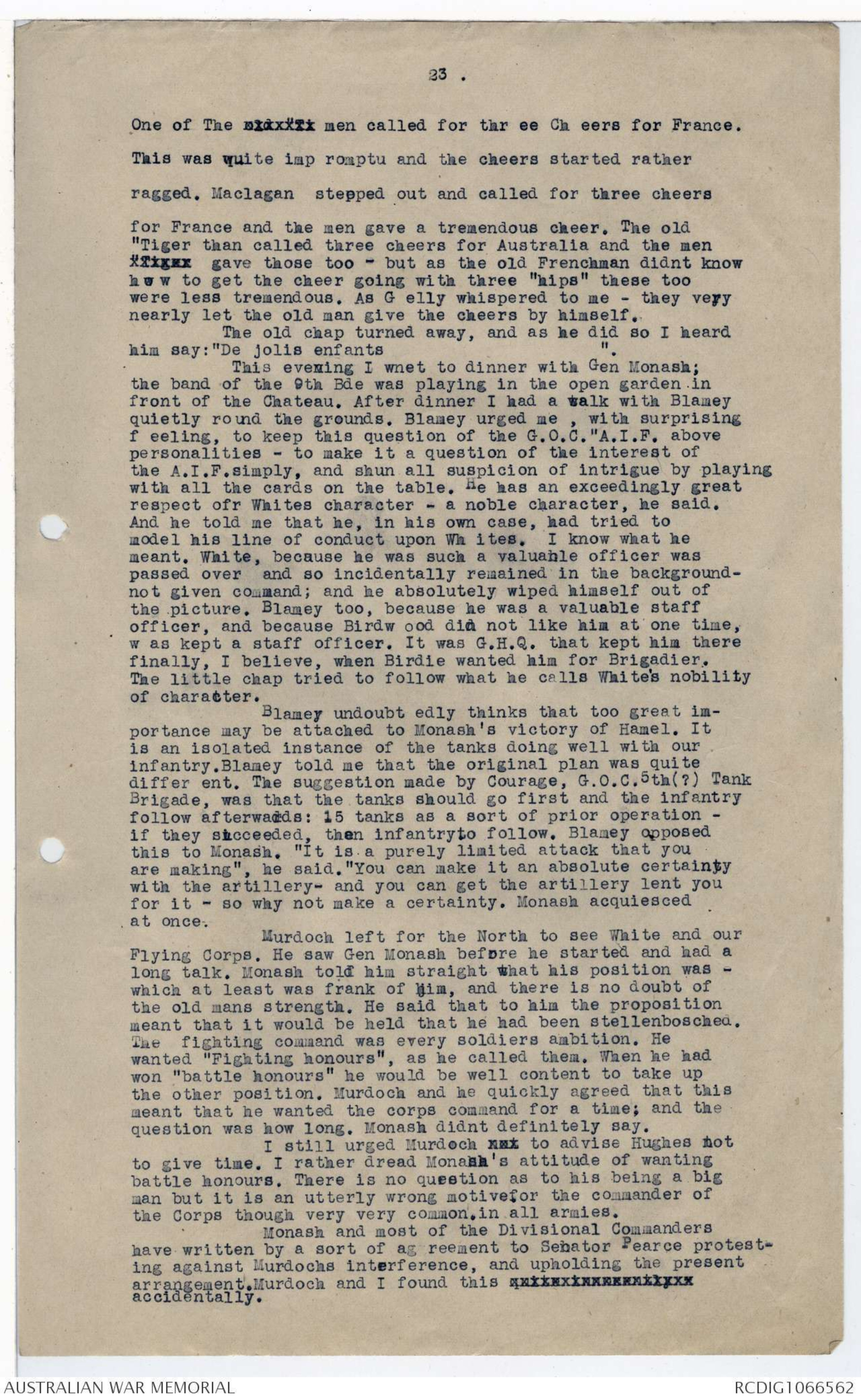
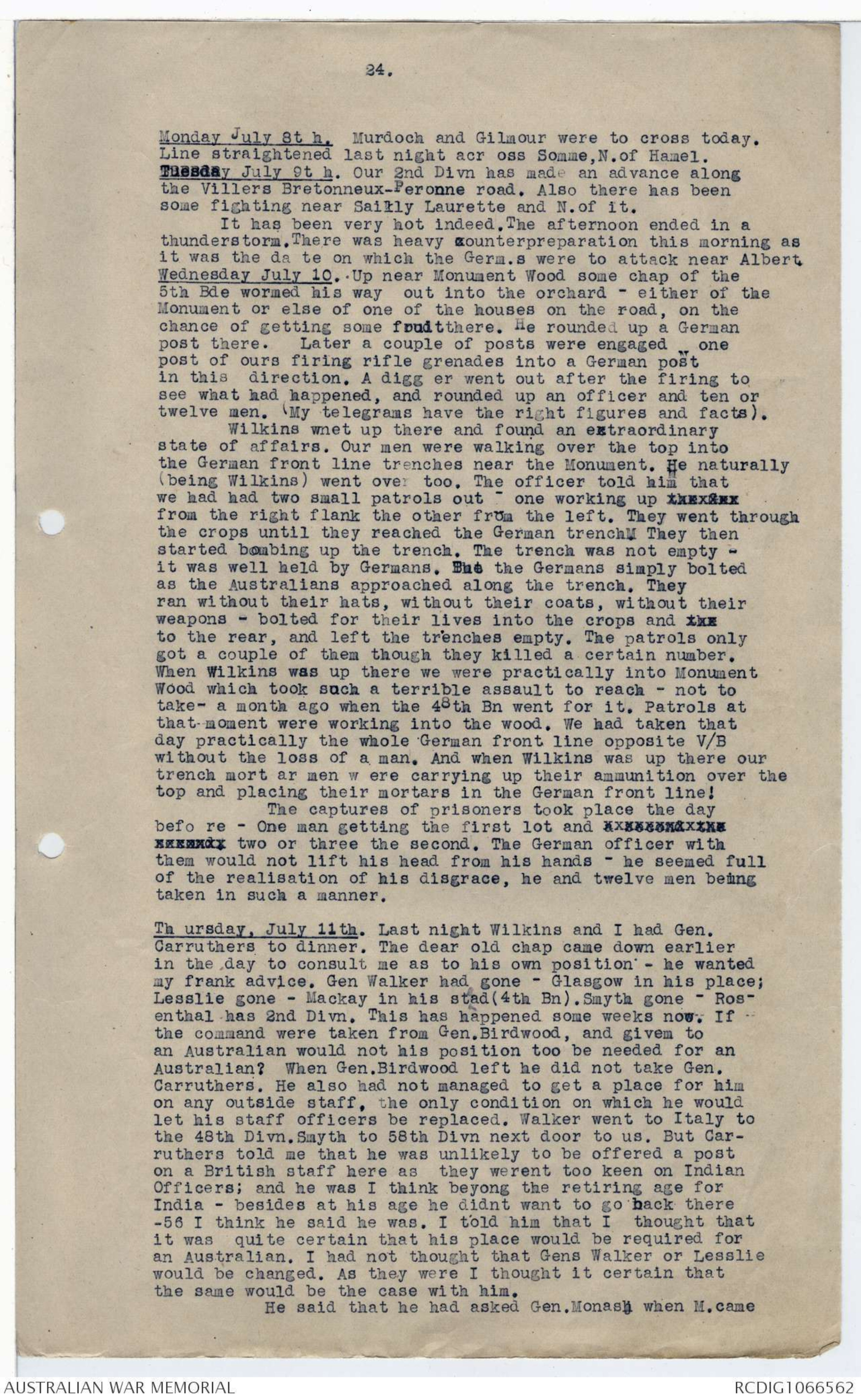
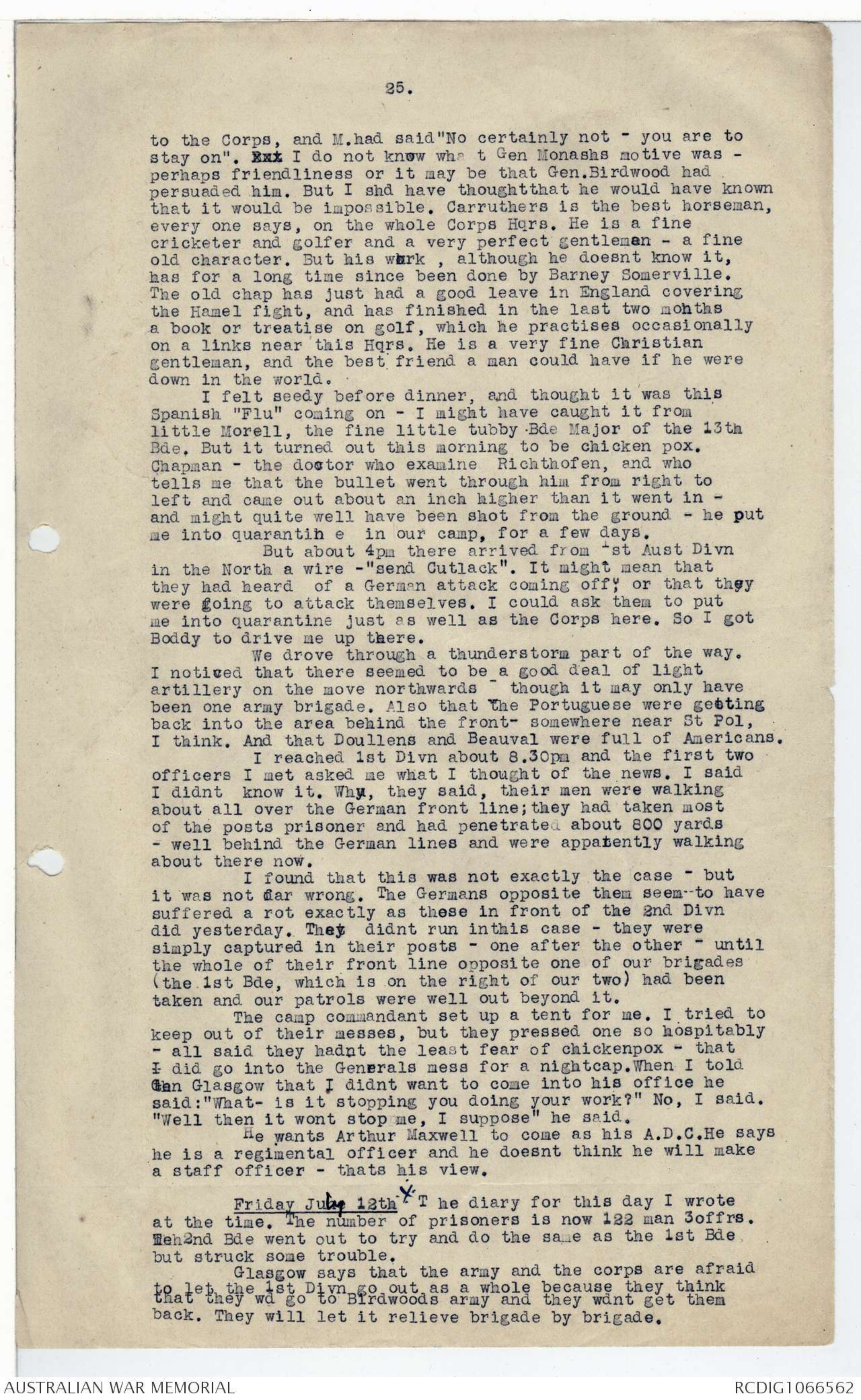
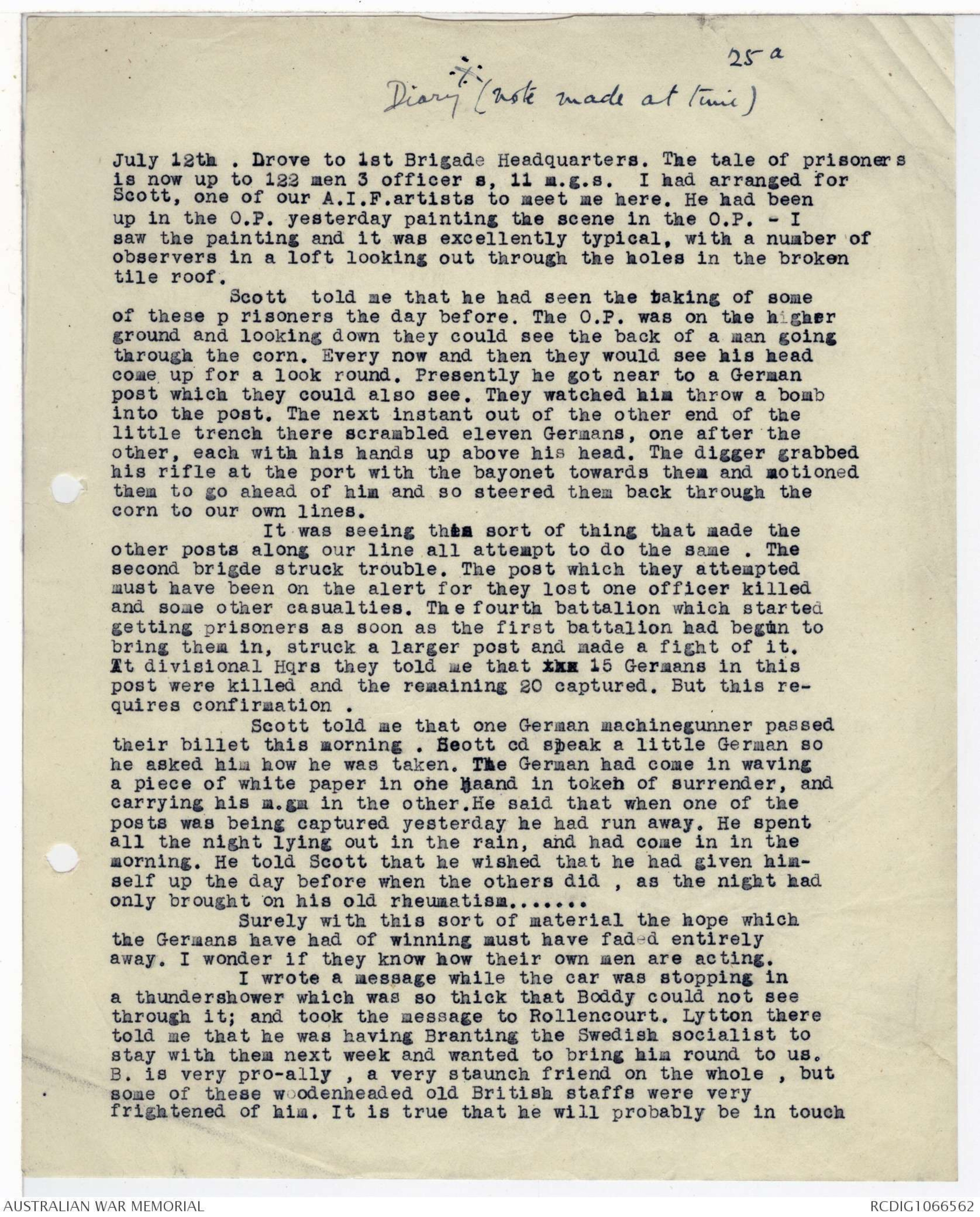
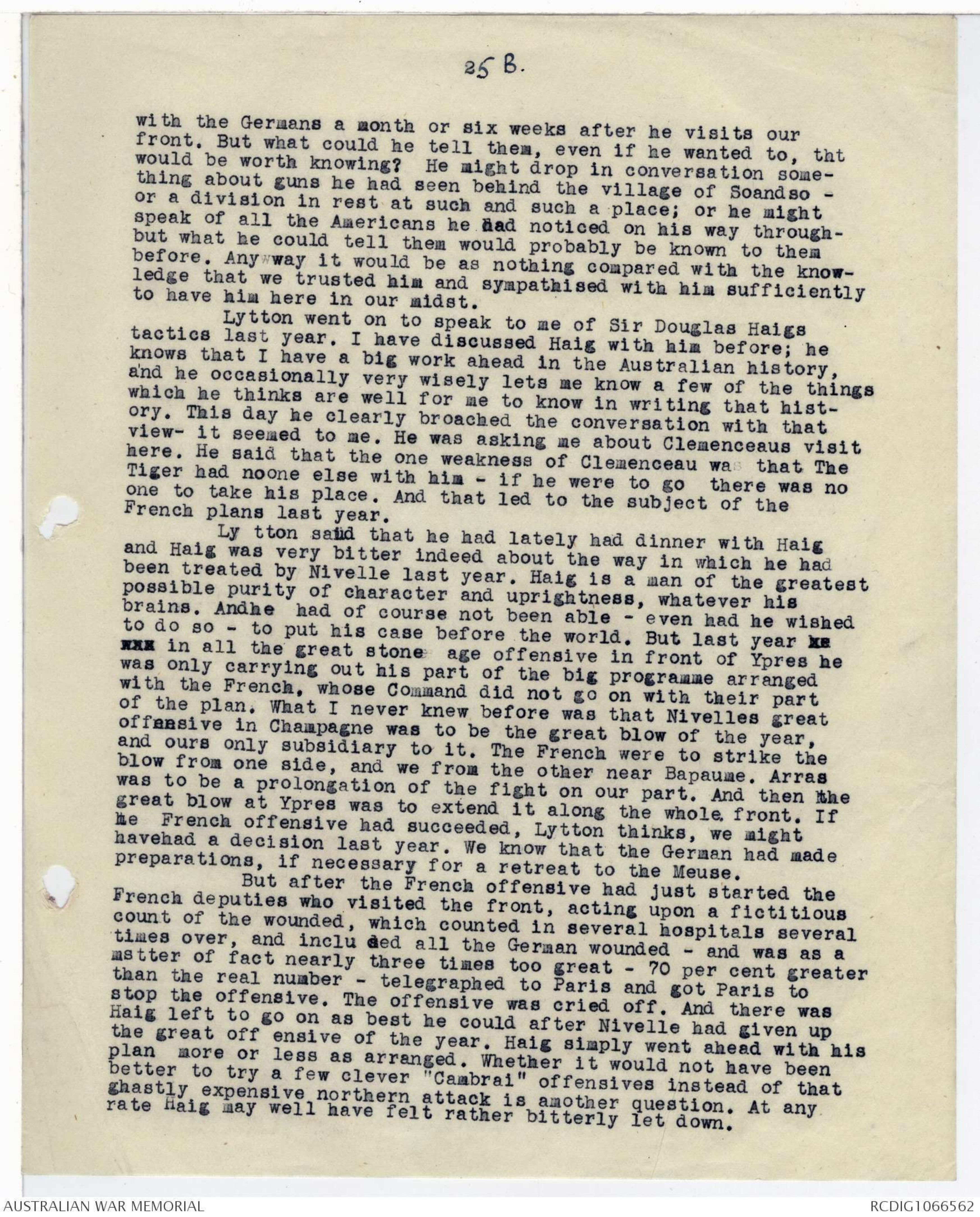
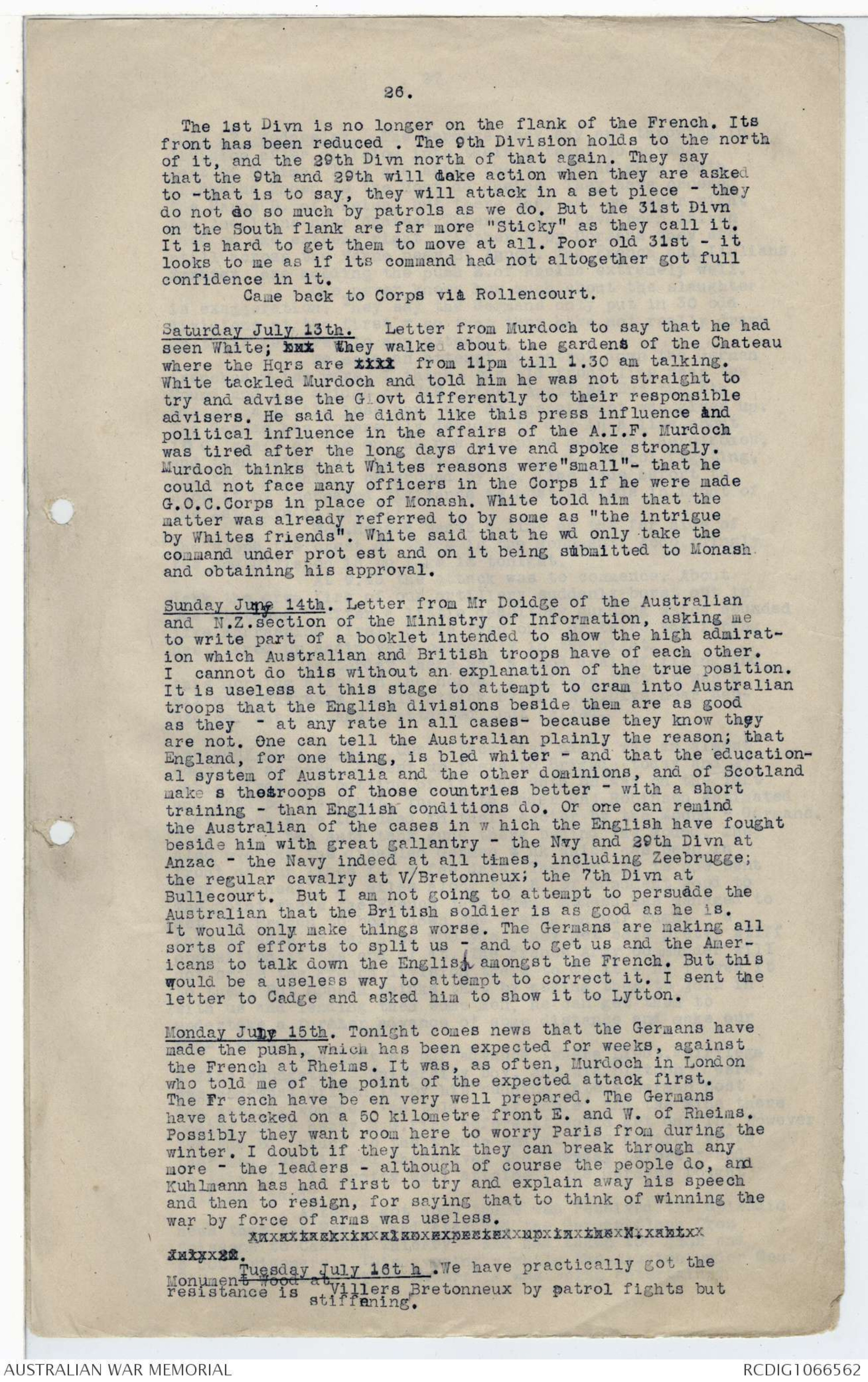
1 9.
July 4th Thursday. I wrote most of this days - and nights -
wonderful experience in the form of an article to the
morning papers; and so I will not repeat it but just try
and decipher the actual notes that I madein the dark, lying
out there from before midnight on the xxxxxxxx July 3rd to
breakfast time on July 4th
Murdoch and Gilmoür and I started after some
dinner at our camp. There was still enough light to guide
us up the hill opposite Bonnay (where we left Boddy) to
the top and through the wood past 12th Bde Hqrs to the little
trench by the briar bush which is my O.P. There was a trench
a little in rear of it, and when we got to the O.P. We
decided that the trench was really if anything better and
more comfortable, not being so deep. We strolled back and
went down to 12th Bde Hqrs and found it in a cellar of
an outlook tower in Welcome"wood. Just after we got there
the Germans put in about half a dozen 5.9s crashing down
through the w ood - the only shells that came anywhere
near us until the following afternoon. I had a yarn to
Arthur Maxwell who is acci ng Staff Captain there and
th en went up about midnight with Murdoch and Gilmour and
Gen.Leane who offered to show us his O.P. He took us to
just outside the edges of the Wood at the top of it. We
lay down there. The night was very quiet. Presently far down
the valley we heard a hum. Murdoch thought it might be one
of our tanks. But it was a plane - the first of our old
night bombing planes. We tho ught they were to stop at
1am. But they didnt- all night till morning they would come
up that valley and then wheel around somewhere in the sky
and fade away down it again, only to be followed by another
drone coming steadily up the valley - and so on, one
after another till dawn. XX For fear of forgetting some
of these things I scrawled them occasionally on my notebook
in the dark, keeping my finger where I had last written
so as not to write twoce over the same.place - with only
moderate success -(that is the way some of my notes in the
first week at Anzac were spoilt:-
Aer oplane. Flares. Flare in clouds.
Another. 3 Searchlights. Flashes of German guns. Shell far
over towards Corbie. 4 Searchlights. Strings of onions.
12.45. S-light cut off. Out searchlight. Last plane after
a big interval. Sound of transport in night. 1.40 Very
few flares .Few odd All very quiet Drone of planes
all the time. Salvoes (indecipherable) . . . (?)whine
goes. . . (something abt flares) Have been asleep.
Flash of shells opposit e. Planes playing game well.
Tracer bullets 2am Yellow flare by Warfusee.
from cloud
We s aw sham transport the other day I think they
are bombing over there. Cutlacks story of a man of
5th Divn (that one was taken two days ago and may have given
away whole story of our attack- Monash afterwds told us
that there was some reason to think that the 5th divn ra id
was known). 2am Harrying shoot.Dull red flashed on horizon.
. . . . Previous days fine. July 4 Cool morning, beautiful
afternoon. Night and July 5 also beautifully fine.
5 mins to 3am. Green flare. 3am Smoke barrage.
Is this right? 3.3am Two reds. Another red. Red again.
More flares. T.M.Smoke. T.M.Smoke has evidently started
at 3. Reds all along line by Warfusee. (German dump blown
up early in night.) Zero! Very different. Our guns
have been in concealed positions. 3.27 Some red flares
on flank. One white flare. 3.41 Barrage has thickened and
lowered. Tracer bullets from low. Are they Germans
shooting at our planes? Hamel burning. Lights in wood
near Warfusee. 4.45 Tanks everywhere beyong Hamel. Beyond
Vaire Wood.
20
(Notees made at time. J .Monash tells me that he had a figght
with the army in order to get the fight on - at 6.p.m. if
it were not declared off then all the Americans cdnt be
got out) . (He says Haig cannot relieve Australians bec.it
wd take 6 or 7 divisions to make a move. He has the Canadians
out and in a fit condition to relieve, but he cannot throw
6 or 7 divisions out ofaction for several days. He has 6
or 7 Biritish divisions which are now recruited into a
pretty good reserve. But he wont put them into V/Bretonneux.
It comes to this, that they must have Australians or Canadians
in V/Bretonneux. Monash has asked to have his line
shortened.M.contends that we are being made full use of
in helping out German attrition.
News of Hamel got to Versailles and the council
sitting there sent its congratulations.)
Just before our bombardment opened, Cutlack and Gullett
came up trough the wood to where we had been lying - Murdoch
had been asleep part of the time and I too for a few minutes.
Cutlack showed us where their O.P. was - and then he and
I and Gullett walked along to our trench. We had barely
got there when the harrassing fire opened at 3 am. xxxx We
watchedit from there for a bit and then went back to the
other s who were lying just outside the edge of the wood.
It was about an hour before the smoke cleared and
the light grew suffuciently for us to see the outline of
the hill behind Hamel - which seemed like the skyline -
so full was the valley ^ beyond of smoke from our smoke shell. Almost
immediately after we saw the first tank - and then three
or four some on either side of it on the‥skyline behind
Hamel and crawling up the hill. Then we could make out a
thick line of infantry between the various tanks - at first
I thoug ht they were stationary, but they must have been
just going on to their last objective, the crooked old
trench beyond Hamel.
I watched there till nearly 8 am. Then went down and
had breakfast (after writing a cable) at 12th Bde Hqrs.
Cutlack went off. And Murdoch Gilmour and I later went
down to 11th Bde Hqrs near Vaux sur Somme - and then across
the fields with Wilkins, who picked us up there, to 4th
Bde Hqrs near Hamelet. I think the German tried a sniping
shot or two at us with whizzbangs as we crossed that flat
but they may not have been meant, and were not very close.
The wounded were coming down, Americans and Australians
mixed. They mix perfectly - get on as well as the Australians
and N.Zealanders. One American whom we spoke to seemed a
little doubtful as to how his particular lot had done. He
seemed to me to think that they had muddled a bit. He
said "If we had had a few more weeks of shellfire we migght
have been more used to it - I think the boys might have
enjoyed themselves then" - But the majority were well
satisfied. Th eir attitude was that they were a bit bewildered
when the barrage came down. Until then I didnt realise
that these Americans had some of them been only four weeks
in France - some eight weeks; and that except for a few
who were sënt up for experience to our units for a few
days at V/Bretonneux, they had never heard a shell before
that morning. They were a bit eager and some of them got
into our own shellfire. On the whole our men are enthusiastic
about them.
July 5 th. Car went off with Cutlack to Boulogne.
Murdoch and Gilmour were summoned suddenly to the Censors.
They went in one of the photographers Fords. I stayed at
the Camp writing up a letter for the morning papers, which
must stand instead of my diary for this fight.
21.
July 6 th. With Murdoch and Gilmour wandered all over the
Somme flats beyond Aubigny searching for the 4th Bde which
was supposed to have two or three of its battalions there.
They were there on the divisional list, but they were
not there in fact - and only came out the next day.
I had to get back to a conference with Gullett and our
A.I.F.artists don at our little camp. Finally found out
that some of the 11th Bde were out at Allonville, so I
left M.and G. there and called back after our conference
and got from the 43rd its story of the fight. The American
officer who had been attached to it had just xxxxxx
finished dinner with them before leaving. He was a modest
chap like all of them. Struck me as very new to it, and
gave me a simple and true little account of his peoples
part.
July 7th.Today M.Clemenceau xxx came up from Paris to
see the 4th Australian Division.XXXXXXXX It is rather a
pretty story.The Supr eme War Council was holding its seventh
session at Versailles .Orlando and Clemenceau and Lloyd
George were ther e and at various times Balfour, Milner,
[*Pershing,*] Sonnino,Pichon, Foch, Sir Henry Wilson," Haig; and during
the third sittingHughes, Borden, and Massey were there
too.While the Council was sitting the news of the Australian
victory at Hamel arrived. They all sent their congratulations
to Xxxxxxxxxx the Australian Corps; Clemenceau was telling
his secretary to telegraph his congratulations also: "No -"
he said, "I'll go and see them and congratulate them
myself". The old chap - he is 78 - goes every Sunday to
some division of the French army - tours hundreds of miles
around the country in a motor car right up to very much
more advanced places than he visited here.
And true to his word he came today. He was to go
to 4th AustMDivn.Headquarters and see quietly a certain
number of the men and officers there. He was to arrive from
the 1st French Army at 1.30pm but he actually arrived at
1.15. I didnt get there till 1.30, and there was a crowd
of officers drawn up, or rather gathered in a rough circle
in front of the huts of the Divl Hqrs at the Quarry to which
they have moved at Bussy (since Col.Mosely their A.D.M.S.
had his leg taken off by a shell in Bussy Chateau) - and
a little square man, in a neat brown sack suit and a crumpled
little felt hat talking to them and smiling. He was most
genial, in his element quite; laughing and smiling all the
time and talking to them in English. I heard that he was
not going to make a speech to them; but presently I saw
Dowse getting a number of the men who were standing in
the background ranged into a sort of rough semicircle.
Then they led the little "Tiger"- the man who is keeping
the French people straight in the war at this time - they
led him round to them and he stood in front of them looking
at them and by the time I got there his speech had well
begun. As I got it it was as follows:-(In English)-
(The first few words I picked up from others
afterwards) "Gentlemen, -" a smile spread over the faces of
a number of the chaps seated around looking up at him"Gentlemen"
-the smile grew-",I hope you will be kind enough to excuse
my faulty English.I know only a little, but I find it very
useful at this moment, this English, because it enables me
to tell you what all the French people think of you.When
the Australians came to France they expected a great deal
of you. First because (here his voice became to low and my
shorthand too defective to follow him). . . . . . . .Secondly,
because they had heard a great deal of what you had accomplished
in your own country. They expected that when you came to
France to fight in this great struggle, which after all
is the same for the French,the English, Australians and
all those who have fought this great war out in the cause
of freedom - which is equal to all - they expected a good
22
deal of you; and I should not like to say that they have
been surprised that you fulfilled that expectation - They
admired it most, that you showed you were capable of doing
what they expected of you. The more they expected of you
the more they held you in admiration.
" Hamel- after all that is not such a great battle;
but I am quite ready to hold that a comparatively short
battle, the man, the fighting man, who goes in to give all
he has , his hopes , his home, hislife itself , in a small
battle shows these qualities in a greater light, the action
of each individual having more result in the final. In a
very large action it is not possible to notice the action
of a few men. ‥‥‥‥But in this fight the Germans saw
that they had before themselves men who came from far away
to attest that wherever free people lived - in England,
France, Australia, New Zealand, Canada and all free countries
- that these were not ready to give way to the Boche who
acted with such barbarity , - who wounded and killed not
only men in battle but women and old men and little children,
who ruined our country and cut down even our fruit trees,
and gardens -
" We have all been fighting together here‥‥
…It is such a wonderful thing that this should happen in
history on these old fields of battle which you had read
of , hearing of wars which you had not seen and the consequences
of which you had never expected to see - that
you should be fighting besid us here on those same old
battlefields of history. Still, it has come true.The work
of our fathers which we wanted to leave unimpaired to our
children they tried to rob us of. They treied to take from
us all that was dearest in modern human society. But all
free men said that the Boche should not do this so long
as they were there to xxxxxxxxx come and prevent him. Men
were the same in Australia in England, inFrance, in Italy,
and all the countries which are proud of being the home of
a free people.And that is what you did- and that is what
made us greet you when you came. We knew you would fight
a real fight, but we did not know that from the very beginning
you would astonish the whole continent.
"I have come here just for the very purpose of
seeing the Australians. I am going back tomorrow to see my
countrymen and tell them. "I have seen the Australians. I
have looked in their faces. xxx I know that these men who
have fought great battles beside us in the cause of freedom
in the past will fight alongside of us again until the cause
of freedom, for which we are all fighting is safe for us
and for our children".
I got the General to ask him if he would care
to give a message to the people of Australia. the old chap
breathed hard - he is a little asthmatic and I fancy , too,
that his feelings were pretty well worked up. He took me
by the arm. "Write", he said, "that I send my heartiest
congratulations to the Australian people on the fine .. the
very fine deeds that their children have accomplished in
this old land that never expected to see them - except to
see them coming back to the old country in timě of peace,
but never in war. We knew what they had accomplished in
their own country. In these dark days and in this old
country (I am not sure of my shorthand here) they showed
what they could do in war. It gives us great pleasure to
acknowledge what they have done . I gr eet the Australian
people and congratulate them with all my heart for what
their ch ildren have accomplished amongst us."
23 .
One of The xxxxxxx men called for thr ee Ch eers for France.
This was quite imp romptu and the cheers started rather
ragged. Maclagan stepped out and called for three cheers
for France and the men gave a tremendous cheer. The old
"Tiger than called three cheers for Australia and the menxxxxxx gave those too - but as the old Frenchman didnt know
h o w to get the cheer going with three "hips" these too
were less tremendous. As G elly whispered to me - they very
nearly let the old man give the cheers by himself.
The old chap turned away, and as he did so I heard
him say: "De jolis enfants ".
This evening I wnet to dinner with Gen Monash;
the band of the 9th Bde was playing in the open garden in
front of the Chateau. After dinner I had a walk with Blamey
quietly round the grounds. Blamey urged me , with surprising
f eeling, to keep this question of the G.O.C. "A.I.F. above
personalities - to make it a question of the interest of
the A.I.F.simply, and shun all suspicion of intrigue by playing
with all the cards on the table. He has an exceedingly great
respect ofr Whites character - a noble character, he said.
And he told me that he, in his own case, had tried to
model his line of conduct upon Wh ites. I know what he
meant. White, because he was such a valuable officer was
passed over and so incidentally remained in the background-
not given command; and he absolutely wiped himself out of
the picture. Blamey too, because he was a valuable staff
officer, and because Birdw ood did not like him at one time,
w as kept a staff officer. It was G.H.Q. that kept him there
finally, I believe, when Birdie wanted him for Brigadier.
The little chap tried to follow what he calls White's nobility
of character.
Blamey undoubt edly thinks that too great importance
may be attached to Monash's victory of Hamel. It
is an isolated instance of the tanks doing well with our
infantry.Blamey told me that the original plan was quite
differ ent. The suggestion made by Courage, G.O.C. 5th(?) Tank
Brigade, was that the tanks should go first and the infantry
follow afterwards: 15 tanks as a sort of prior operation -
if they succeeded, then infantryto follow. Blamey opposed
this to Monash. "It is a purely limited attack that you
are making", he said. "You can make it an absolute certainty
with the artillery- and you can get the artillery lent you
for it - so why not make a certainty. Monash acquiesced
at once.
Murdoch left for the North to see White and our
Flying Corps. He saw Gen Monash before he started and had a
long talk. Monash told him straight what his position was -
which at least was frank of him, and there is no doubt of
the old mans strength. He said that to him the proposition
meant that it would be held that he had been stellenbosched.
The fighting command was every soldiers ambition. He
wanted "Fighting honours", as he called them. When he had
won "battle honours" he would be well content to take up
the other position. Murdoch and he quickly agreed that this
meant that he wanted the corps command for a time; and the
question was how long. Monash didnt definitely say.
I still urged Murdoch xxx to advise Hughes not
to give time. I rather dread Monash's attitude of wanting
battle honours. There is no question as to his being a big
man but it is an utterly wrong motivefor the commander of
the Corps though very very common.in all armies.
Monash and most of the Divisional Commanders
have written by a sort of agreement to Senator Pearce protesting
against Murdochs interference, and upholding the present
arrangement. Murdoch and I found this quite xxxxxxxxxxxxxxxxxx
accidentally.
24.
Monday July 8t h. Murdoch and Gilmour were to cross today.
Line straightened last night acr oss Somme,N.of Hamel.
Tuesday July 9t h. Our 2nd Divn has made an advance along
the Villers Bretonneux-Peronne road. Also there has been
some fighting near Sailly Laurette and N.of it.
It has been very hot indeed.The afternoon ended in a
thunderstorm.There was heavy xcounterpreparation this morning as
it was the da te on which the Germ.s were to attack near Albert.
Wednesday July 10. Up near Monument Wood some chap of the
5th Bde wormed his way out into the orchard - either of the
Monument or else of one of the houses on the road, on the
chance of getting some fruitthere. He rounded up a German
post there. Later a couple of posts were engaged .. one
post of ours firing rifle grenades into a German post
in this direction. A digg er went out after the firing to
see what had happened, and rounded up an officer and ten or
twelve men. (My telegrams have the right figures and facts).
Wilkins wnet up there and found an extraordinary
state of affairs. Our men were walking over the top into
the German front line trenches near the Monument. He naturally
(being Wilkins) went over too. The officer told him that
we had had two small patrols out - one working up xxxxxxx
from the right flank the other from the left. They went through
the crops until they reached the German trenchM They then
started bombing up the trench. The trench was not empty -
it was well held by Germans. But the Germans simply bolted
as the Australians approached along the trench. They
ran without their hats, without their coats, without their
weapons - bolted for their lives into the crops and xxx
to the rear, and left the trenches empty. The patrols only
got a couple of them though they killed a certain number.
When Wilkins was up there we were practically into Monument
Wood which took such a terrible assault to reach - not to
take- a month ago when the 48th Bn went for it. Patrols at
that moment were working into the wood. We had taken that
day practically the whole German front line opposite V/B
without the loss of a man. And when Wilkins was up there our
trench mort ar men w ere carrying up their ammunition over the
top and placing their mortars in the German front line!
The captures of prisoners took place the day
befo re - One man getting the first lot and xxxxxxxxxxxxxxxxxxx two or three the second. The German officer with
them would not lift his head from his hands - he seemed full
of the realisation of his disgrace, he and twelve men being
taken in such a manner.
Th ursday, July 11th. Last night Wilkins and I had Gen.
Carruthers to dinner. The dear old chap came down earlier
in the day to consult me as to his own position - he wanted
my frank advice. Gen Walker had gone - Glasgow in his place;
Lesslie gone - Mackay in his st^ead (4th Bn). Smyth gone - Rosenthal
has 2nd Divn. This has happened some weeks now. If
the command were taken from Gen.Birdwood, and givem to
an Australian would not his position too be needed for an
Australian? When Gen.Birdwood left he did not take Gen.
Carruthers. He also had not managed to get a place for him
on any outside staff, the only condition on which he would
let his staff officers be replaced. Walker went to Italy to
the 48th Divn.Smyth to 58th Divn next door to us. But Carruthers
told me that he was unlikely to be offered a post
on a British staff here as they werent too keen on Indian
Officers; and he was I think beyong the retiring age for
India - besides at his age he didnt want to go back there
-56 I think he said he was. I told him that I thought that
it was quite certain that his place would be required for
an Australian. I had not thought that Gens Walker or Lesslie
would be changed. As they were I thought it certain that
the same would be the case with him.
He said that he had asked Gen.Monash when M.came
25.
to the Corps, and M.had said "No certainly not - you are to
stay on". xxx I do not know wha t Gen Monashs motive was -
perhaps friendliness or it may be that Gen.Birdwood had
persuaded him. But I shd have thoughtthat he would have known
that it would be impossible. Carruthers is the best horseman,
every one says, on the whole Corps Hqrs. He is a fine
cricketer and golfer and a very perfect gentleman - a fine
old character. But his work , although he doesnt know it,
has for a long time since been done by Barney Somerville.
The old chap has just had a good leave in England covering
the Hamel fight, and has finished in the last two months
a book or treatise on golf, which he practises occasionally
on a links near this Hqrs. He is a very fine Christian
gentleman, and the best friend a man could have if he were
down in the world.
I felt seedy before dinner, and thought it was this
Spanish "Flu" coming on - I might have caught it from
little Morell, the fine little tubby Bde Major of the 13th
Bde. But it turned out this morning to be chicken pox.
Chapman - the doctor who examine Richthofen, and who
tells me that the bullet went through him from right to
left and came out about an inch higher than it went in -
and might quite well have been shot from the ground - he put
me into quarantin e in our camp, for a few days.
But about 4pm there arrived from 1st Aust Divn
in the North a wire -"send Cutlack". It might mean that
they had heard of a German attack coming off, or that they
were going to attack themselves. I could ask them to put
me into quarantine just as well as the Corps here. So I got
Boddy to drive me up there.
We drove through a thunderstorm part of the way.
I noticed that there seemed to be a good deal of light
artillery on the move northwards - though it may only have
been one army brigade. Also that the Portuguese were getting
back into the area behind the front- somewhere near St Pol,
I think. And that Doullens and Beauval were full of Americans.
I reached 1st Divn about 8.30pm and the first two
officers I met asked me what I thought of the news. I said
I didnt know it. Why, they said, their men were walking
about all over the German front line; they had taken most
of the posts prisoner and had penetrated about 800 yards
- well behind the German lines and were apparently walking
about there now.
I found that this was not exactly the case - but
it was not far wrong. The Germans opposite them seem to have
suffered a rot exactly as these in front of the 2nd Divn
did yesterday. They didnt run inthis case - they were
simply captured in their posts - one after the other - until
the whole of their front line opposite one of our brigades
(the 1st Bde, which is on the right of our two) had been
taken and our patrols were well out beyond it.
The camp commandant set up a tent for me. I tried to
keep out of their messes, but they pressed one so hospitably
- all said they hadnt the least fear of chickenpox - that
I did go into the Generals mess for a nightcap. When I told
Gen Glasgow that I didnt want to come into his office he
said: "What- is it stopping you doing your work?” No, I said.
"Well then it wont stop me, I suppose" he said.
He wants Arthur Maxwell to come as his A.D.C.He says
he is a regimental officer and he doesnt think he will make
a staff officer - thats his view.
Friday July 12th ※The diary for this day I wrote
at the time. The number of prisoners is now 122 man 3offrs.
Teh2nd Bde went out to try and do the same as the 1st Bde
but struck some trouble.
Glasgow says that the army and the corps are afraid
to let the 1st Divn go out as a whole because they think
that they wd go to Birdwoods army and they wdnt get them
back. They will let it relieve brigade by brigade.
25 a
[*※Diary (note made at time)*]
July 12th . Drove to 1st Brigade Headquarters. The tale of prisoner s
is now up to 122 men 3 officer s, 11 m.g.s. I had arranged for
Scott, one of our A.I.F.artists to meet me here. He had been
up in the O.P. yesterday painting the scene in the O.P. - I
saw the painting and it was excellently typical, with a number of
observers in a loft looking out through the holes in the broken
tile roof.
Scott told me that he had seen the taking of some
of these p risoners the day before. The O.P. was on the higher
ground and looking down they could see the back of a man going
through the corn. Every now and then they would see his head
come up for a look round. Presently he got near to a German
post which they could also see. They watched him throw a bomb
into the post. The next instant out of the other end of the
little trench there scrambled eleven Germans, one after the
other, each with his hands up above his head. The digger grabbed
his rifle at the port with the bayonet towards them and motioned
them to go ahead of him and so steered them back through the
corn to our own lines.
It was seeing this sort of thing that made the
other posts along our line all attempt to do the same . The
second brigde struck trouble. The post which they attempted
must have been on the alert for they lost one officer killed
and some other casualties. The fourth battalion which started
getting prisoners as soon as the first battalion had begun to
bring them in, struck a larger post and made a fight of it.
At divisional Hqrs they told me that xxx 15 Germans in this
post were killed and the remaining 20 captured. But this requires
confirmation .
Scott told me that one German machinegunner passed
their billet this morning . Scott cd speak a little German so
he asked him how he was taken. The German had come in waving
a piece of white paper in one haand in token of surrender, and
carrying his m.gm in the other. He said that when one of the
posts was being captured yesterday he had run away. He spent
all the night lying out in the rain, and had come in in the
morning. He told Scott that he wished that he had given himself
up the day before when the others did , as the night had
only brought on his old rheumatism.......
Surely with this sort of material the hope which
the Germans have had of winning must have faded entirely
away. I wonder if they know how their own men are acting.
I wrote a message while the car was stopping in
a thundershower which was so thick that Boddy could not see
through it; and took the message to Rollencourt. Lytton there
told me that he was having Branting the Swedish socialist to
stay with them next week and wanted to bring him round to us.
B. is very pro-ally , a very staunch friend on the whole , but
some of these woodenheaded old British staffs were very
frightened of him. It is true that he will probably be in touch
25 B.
with the Germans a month or six weeks after he visits our
front. But what could he tell them, even if he wanted to, tht
would be worth knowing? He might drop in conversation something
about guns he had seen behind the village of Soandso -
or a division in rest at such and such a place; or he might
speak of all the Americans he had noticed on his way through-
but what he could tell them would probably be known to them
before. Anywway it would be as nothing compared with the knowledge
that we trusted him and sympathised with him sufficiently
to have him here in our midst.
Lytton went on to speak to me of Sir Douglas Haigs
tactics last year. I have discussed Haig with him before; he
knows that I have a big work ahead in the Australian history,
and he occasionally very wisely lets me know a few of the things
which he thinks are well for me to know in writing that history.
This day he clearly broached the conversation with that
view- it seemed to me. He was asking me about Clemenceaus visit
here. He said that the one weakness of Clemenceau was that The
Tiger had noone else with him - if he were to go there was no
one to take his place. And that led to the subject of the
French plans last year.
Ly tton said that he had lately had dinner with Haig
and Haig was very bitter indeed about the way in which he had
been treated by Nivelle last year. Haig is a man of the greatest
possible purity of character and uprightness, whatever his
brains. Andhe had of course not been able - even had he wished
to do so - to put his case before the world. But last year xxxxx in all the great stone age offensive in front of Ypres he
was only carrying out his part of the big programme arranged
with the French, whose Command did not go on with their part
of the plan. What I never knew before was that Nivelles great
offensive in Champagne was to be the great blow of the year,
and ours only subsidiary to it. The French were to strike the
blow from one side, and we from the other near Bapaume. Arras
was to be a prolongation of the fight on our part. And then the
great blow at Ypres was to extend it along the whole front. If
the French offensive had succeeded, Lytton thinks, we might
havehad a decision last year. We know that the German had made
preparations, if necessary for a retreat to the Meuse.
But after the French offensive had just started the
French deputies who visited the front, acting upon a fictitious
count of the wounded, which counted in several hospitals several
times over, and inclu ded all the German wounded - and was as a
mstter of fact nearly three times too great - 70 per cent greater
than the real number - telegraphed to Paris and got Paris to
stop the offensive. The offensive was cried off. And there was
Haig left to go on as best he could after Nivelle had given up
the great off ensive of the year. Haig simply went ahead with his
plan more or less as arranged. Whether it would not have been
better to try a few clever "Cambrai" offensives instead of that
ghastly expensive northern attack is amother question. At any
rate Haig may well have felt rather bitterly let down.
26.
The 1st Divn is no longer on the flank of the French. Its
front has been reduced . The 9th Division holds to the north
of it, and the 29th Divn north of that again. They say
that the 9th and 29th will take action when they are asked
to -that is to say, they will attack in a set piece - they
do not do so much by patrols as we do. But the 31st Divn
on the South flank are far more "Sticky" as they call it.
It is hard to get them to move at all. Poor old 31st - it
looks to me as if its command had not altogether got full
confidence in it.
Came back to Corps via Rollencourt.
Saturday July 13th. Letter from Murdoch to say that he had
seen White; xxx they walked about the gardens of the Chateau
where the Hqrs are xxxx from 11pm till 1.30 am talking.
White tackled Murdoch and told him he was not straight to
try and advise the Giovt differently to their responsible
advisers. He said he didnt like this press influence and
political influence in the affairs of the A.I.F. Murdoch
was tired after the long days drive and spoke strongly.
Murdoch thinks that Whites reasons were"small"- that he
could not face many officers in the Corps if he were made
G.O.C.Corps in place of Monash. White told him that the
matter was already referred to by some as "the intrigue
by Whites friends". White said that he wd only take the
command under prot est and on it being submitted to Monash
and obtaining his approval.
Sunday July 14th. Letter from Mr Doidge of the Australian
and N.Z.section of the Ministry of Information, asking me
to write part of a booklet intended to show the high admiration
which Australian and British troops have of each other.
I cannot do this without an explanation of the true position.
It is useless at this stage to attempt to cram into Australian
troops that the English divisions beside them are as good
as they - at any rate in all cases- because they know they
are not. One can tell the Australian plainly the reason; that
England, for one thing, is bled whiter - and that the educational
system of Australia and the other dominions, and of Scotland
makes thetroops of those countries better - with a short
training - than English conditions do. Or one can remind
the Australian of the cases in w hich the English have fought
beside him with great gallantry - the Nvy and 29th Divn at
Anzac - the Navy indeed at all times, including Zeebrugge;
the regular cavalry at V/Bretonneux; the 7th Divn at
Bullecourt. But I am not going to attempt to persuade the
Australian that the British soldier is as good as he is.
It would only make things worse. The Germans are making all
sorts of efforts to split us - and to get us and the Americans
to talk down the English amongst the French. But this
would be a useless way to attempt to correct it. I sent the
letter to Cadge and asked him to show it to Lytton.
Monday July 15th. Tonight comes news that the Germans have
made the push, which has been expected for weeks, against
the French at Rheims. It was, as often, Murdoch in London
who told me of the point of the expected attack first.
The Fr ench have be en very well prepared. The Germans
have attacked on a 50 kilometre front E. and W. of Rheims.
Possibly they want room here to worry Paris from during the
winter. I doubt if they think they can break through any
more - the leaders - although of course the people do, and
Kuhlmann has had first to try and explain away his speech
and then to resign, for saying that to think of winning the
war by force of arms was useless.xxxxxxxxxxxxxxxxxxxxxxxxxxxxxxxxxxxxxxxxxxxxxxxxxxx.
Tuesday July 16t h .We have practically got the
Monument Wood at Villers Bretonneux by patrol fights but
resistance is stiffening.
 Diane Ware
Diane WareThis transcription item is now locked to you for editing. To release the lock either Save your changes or Cancel.
This lock will be automatically released after 60 minutes of inactivity.